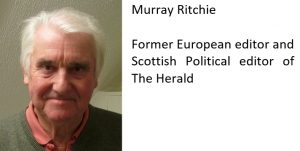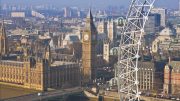Leaving the single market and customs union is believed to have reduced UK trade in goods to the EU by £14 billion a month, writes Murray Ritchie.
While the United Kingdom slithers dangerously towards recession and a possible trade war with the European Union a political conspiracy of silence is taking place. No politician talks openly about one of the obvious causes: Brexit.
Boris Johnson, the UK Conservative prime minister and champion Brexiteer, insists at every opportunity that Brexit is a fait accompli. No point in arguing. The people decided and that is that. It cannot be undone. Move on.
In Westminster the leader of the Labour Opposition, Sir Keir Starmer, is also firmly on the record: “We can’t reverse Brexit. There is no case for re-joining the EU.” End of.
Oh no?
In the view of half of the country, according to most polls, both Johnson and Starmer are talking nonsense. There is an obvious case for at least softening Brexit and the damage it is wreaking on the British economy.
No politician with a vote at risk seems prepared to come out publicly and demand at least a discussion. Well, apart from a few determined last-ditchers in the European Movement who are trying and failing so far to get a debate running on reducing the worst of Brexit’s sabotage.
Obviously, an early return to EU membership is not on the cards. But could not Britain at least discuss re-joining the EU single market and/or customs union?
Apparently not. That seems also to be subject to political cross-party omertà.
Two of the UK’s four nations voted against Brexit and two to Remain. Didn’t matter, of course, because England with the biggest population narrowly swung the vote for Brexit. In Northern Ireland – which voted Remain – the Democratic Unionist Party turned its back on the will of its own people by throwing in its lot with the English Tories, helping to bring about a hard Brexit.
Ironically, the DUP are now whingeing about their own policy’s direct consequence.
With their obsessive “we are British” (no-one argues) mantra they are even seemingly prepared to risk a return to the hideous history of the Irish troubles in order to remove the protocol which gives their own people at least some relief from Brexit through the Good Friday Agreement.
Yet, this is the very deal which maintains a peaceful and open trading border between them and the Republic and preserves peace. In pursuit of this egregious demand the DUP has now sabotaged democratic government in Northern Ireland by refusing to share power with the election winners, Sinn Fein. You couldn’t make it up.
In Northern Ireland – which voted Remain – the Democratic Unionist Party turned its back on the will of its own people by throwing in its lot with the English Tories, helping to bring about a hard Brexit
Johnson and his Conservatives placed a border notionally in the Irish sea to avoid one on the island of Ireland. This was Johnson’s own plan (although he promised it wouldn’t happen) and it allowed the Northern Irish to follow EU single market trading rules and keep the peace.
Yet, the more paranoid Unionist elements see this as somehow making Northern Ireland less British. In true Boris fashion the British prime minister says he is prepared to torpedo his own policy – to the horror of the EU and the pro-Irish US president.
At the very least this can never be regarded as a shining example of Johnson’s boasted Brexit bonuses.
Meanwhile, across the rest of the UK, the mounting cost of Brexit continues in spooky silence.
You don’t read about it in the UK press. Politicians blame the economic mess on Ukraine or Covid, but Brexit is the cause which dare not speak its name. Perhaps those rabidly anti-EU newspapers are too embarrassed to face it.
Similarly, the UK’s television and radio industry seems struck dumb on Brexit. Where are the bold Panorama programmes investigating the damage? Non-existent.
Take borders, where Brexit was supposed to strengthen UK control. Asylum seekers and refugees still cross the channel to England in large numbers and in deadly danger. This, after Brexit, encouraged the UK to pay France millions to help bolster British border security. A neat example of business outsourcing. But taking back control? Hardly.
In pro-Remain Scotland the ruling SNP, fresh from its latest easy win in local elections, talks of re-joining the EU one day in the far future and grumbles about Brexit’s unfairness. But that is about the extent of vocal opposition from elected bodies in the UK.
The European Movement is attempting, but struggling, to force some public debate. Describing Brexit as “disastrous” and a “calamity” it states that Brexit and Boris Johnson are fuelling the biggest cost of living crisis in half a century and threatening a trade war with the EU while “obliterating our relationship with our neighbours at a pivotal time for the future of Europe”.
Then, there is the prospect of inflation rising to 10 per cent, food shortages, and a looming winter of discontent, which might well spill onto the streets. Mix in mounting estimates for the untold billions of pounds in Brexit costs which no-one in government seems able or willing so far to quantify with accuracy.
We don’t know the true cost but it must be in the tens of billions of pounds at least. If government knows the truth it doesn’t want to share it.
The UK’s biggest fresh food export to Europe is Scottish salmon. The entire industry would be wrecked by a trade war with catastrophic consequences
We know British exports to the EU fell by 40 per cent and imports dropped by 30 per cent between December 2020 and January last year. The Centre for European Reform thought leaving the single market and customs union had reduced UK trade in goods by £14bn a month in more recent times.
The independent Bank of England, blamed by Johnson for not preventing the soaraway cost of living, denies a report that it once assessed Brexit’s costs at £400m. But that figure, even if true, is now years out of date.
Chief-Exec.com asked the Bank for an update. “We don’t have any estimate,” was the response. “We have never produced figures like that.” Is that not rather odd?
Meanwhile, importers and exporters and manufacturers and producers from Scottish fishermen to English farmers suffer crushing regulation. The UK’s biggest fresh food export to Europe is Scottish salmon. The entire industry would be wrecked by a trade war with catastrophic consequences, according to Tavis Scott, its spokesman.
But you won’t read or hear much concern about that in London. What you will hear from Johnson are soundbites about a Brexit bonanza, a bonfire of the Brexit rules, and so on.
We are surely entitled to wonder if, in his most private moments, the prime minister harbours a tiny doubt that perhaps his “get Brexit done” slogan was the biggest mistake of the many he has made in his life.
But you won’t read or hear any of that either.
Silence rules.





